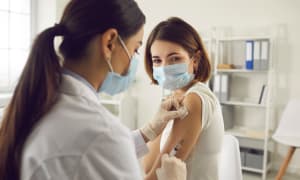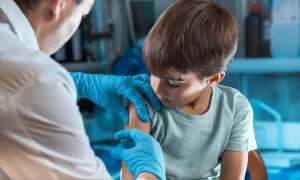THE head of Sunraysia's largest Aboriginal services organisation says keeping the Aboriginal community safe from COVID-19 will be an ongoing "slow burn" issue, after seeing a "significant increase" in positive results in rapid testing numbers.
Mallee District Aboriginal Services (MDAS) chief executive Jacki Turfrey told Sunraysia Daily after a community health response drove a decline in positive test numbers up to the end of last weekend, she was concerned recent rapid testing conducted by MDAS showed a "jump in numbers" of positive results.
"I'm starting to see a significant increase in positive testing again, through my clinic," Ms Turfrey said.
"We use the rapid testing cartridges. If they come up positive, they have to be retested. Some of those positives come back as false positives, so that number can reduce.
"And then from there, they then have to go into Kirby Institute in Melbourne, where they're further tested, and some of the numbers can reduce again.
"What I see live-time here in my clinic (is) a very good indication of what's going on, but it's not a perfect system."
Victorian Chief Health Officer Brett Sutton said on Friday the Victorian Government would provide additional support to make vaccinations available to "priority" and "at-risk" communities.
Professor Sutton said Star Health and the Victorian Aboriginal Controlled Health Organisation had partnered to deliver two fixed vaccination sites with assisted transport.
"More than 100 doses were delivered through this model (Thursday) and we have got two mobile in-home vans delivering vaccination right to people's doorsteps over coming days," Prof Sutton said.
"We are going to look out for our priority and at-risk populations – we don't want to leave anyone behind, we will reach in to you, but please reach back out to us by taking those opportunities to get vaccinated."
While the MDAS pop-up clinic on Orange Avenue has delivered 11,000 vaccines since the end of July, Ms Turfrey said the static model of vaccine delivery had served to vaccinate only "half of our community".
"The real challenge for us is the group now who are not vaccinated are dominantly the group that are most disadvantaged, who don't actually reach out to health services typically," Ms Turfrey said.
"We're now looking at other models and one we were tossing around was our branded bus, our Koori night patrol bus, going out door-to-door delivering both vaccines and testing.
"We were able to do that while we had the two Department of Health nurses working with us. And they did a great job. They were on the road daily, delivering that service.
"The difference between that and the vaccine clinic is I can put out 300-plus vaccines a day in our vaccine clinic, (but) I was delivering around six vaccines a day in the bus method.
"Every six is a good six. But it's not very much.
"We just have to keep chipping away at those numbers because every little bit of increase is worth it in terms of long-term health outcomes."
Ms Turfrey said the arrival of a non-urgent patient transport vehicle from the State Government on Wednesday had so far helped with non-urgent patient transport, after MDAS relied on police vehicles for support in recent weeks.
"We've had to resort to asking the police to assist us, which isn't great for the police, because they then face their own risks.
"The only safe transport option they have is a (police) van, which is really bad for our community.
"They have bent over backwards and helped us and then when they use one of their vehicles for that purpose, they then have to deep-clean as well, and they're not prepared for that."
With MDAS relying on its own funding to vaccinate and support community members affected by infection, Ms Turfrey said she was concerned about the ongoing resource, staffing and financial costs to the organisation.
"Because of the work we do, we're on the front line, so we're more likely to be affected by positive cases.
"I have a very large number of staff furloughed as a result of our positive case.
"We will need, as an organisation, ongoing support from government to assist us in the workforce planning space. So we can maintain an active workforce, particularly in the critical areas of our health clinic, and our immunisers and our testers."
Ms Turfrey said MDAS would look to combine its effort with Sunraysia Community Health Services, allowing MDAS to provide outreach and additional pop-up services.
"They've got a model that is a very mobile pop-up, which means we can then target specific communities and specific areas and place a vaccination testing site right in the middle of that community."
"This is a long-term issue, like a slow burn, rather than that rapid burn that's gone through in the first week and a half."





